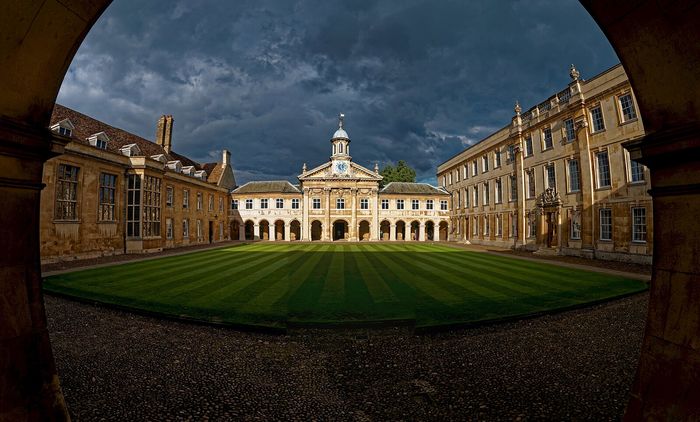Cambridge’s new free speech code is a return to the culture wars
Sam Moore argues that in following now-abandoned Tory legislation, the University’s new free speech code creates problems for itself — and for its students

Last month, Bridget Phillipson, the education secretary, shelved the previous government’s controversial Higher Education (Freedom of Speech) Act amidst concerns that it would encourage hate speech on campus. The Higher Education Act had been a response to the de-platforming of divisive figures by students’ unions across the country but it was widely criticised for treating free speech as more important than student welfare. Now, the act is likely dead but its influence lives on in Cambridge.
Earlier this month (01/08), the University introduced a new, absolutist free speech code which is based on the now-dormant act. The code vows to protect the academics’ ability to voice “controversial” and “unpopular” opinions on campus without the threat of disciplinary action like dismissal or being made ineligible for promotion. Free speech is of course fundamental, but the truth is that universities themselves already have a legal obligation to protect free speech via the Human Rights Act. Cambridge’s code, and the act that animated it, go further than this by ensuring free speech prevails over the competing right of students to live free from discrimination and harassment.
“Cambridge risks being seen as cosying up to a now-defunct national policy”
There is a reason why Phillipson removed the legal obligation for universities to introduce these new free speech absolutist codes. The proposed resolution mechanisms for free speech incidents had been described as “burdensome” and “disruptive”. They included a free-to-use free speech complaints scheme and a statutory tort that would have allowed academics to take universities to court if they felt free speech was infringed. As Daniel Zeichner, MP for Cambridge, put it, the act would have given “those with really outlandish views, a legal stick with which to beat institutions.” The University of Cambridge risks being seen as cosying up to a now-defunct national policy that could undermine its ability to protect campus inclusivity.
Cambridge’s free speech code will galvanise the 600 academics who have signed an open letter that urges Bridget Phillipson to reinstate the act. They argue that because only lawful free speech is covered by the act, and “English law already provides strong protections against harassment and incitement to hatred”, no further limits to free speech are necessary – and so the act’s protections for speech are a positive development.
This oversimplifies a complicated legal picture. Drawing the line at the law seems logical, but if you force universities to permit all legal speech, you risk encouraging them to permit illegal speech too. Punishing speakers for incitement offences, and other speech-related crimes, involves regulatory risks and legal costs just to determine which side of the line a given speaker is on. The result is that universities are deterred from taking swift disciplinary action which keeps students safe, because they no longer know where they stand legally.
“Cambridge’s code is a solution in search of a problem”
We are dealing with more than hypotheticals here – in the last year alone, Cambridge has been no stranger to ‘free-speech’ incidents. In February the ‘race-realist’ beliefs of the then Cambridge philosophy researcher Nathan Cofnas emerged. Cofnas’ blog interspersed sporadic philosophical references with claims that without positive discrimination, black people would “disappear” from “almost all high-profile positions outside of sports and entertainment”. Cofnas is now suing Emmanuel College over his dismissal, but were he to have posted his blog now rather than back in February then it is possible he would still be teaching at Cambridge.
The truth is that Cambridge’s code and the dying Tory government’s act is a solution in search of a problem. Helen Joyce, a ‘gender-critical’ author, is one of the academics who has deplored the “censoriousness” of Cambridge, as fellow free speech advocate Arif Ahmed put it. Back in 2022, she gave a speech at Gonville & Caius College on her book Trans: When Ideology Meets Reality and was met with peaceful protest by students across Cambridge. Joyce now claims the left has “fallen out of love with free speech”. But surely her experience reflects the healthy interaction of different free speech rights in a diverse, liberal university community? Free speech cannot be understood as an entitlement to spew divisive content down the nearest microphone unopposed. It does not confer a duty upon universities to amplify the free speech rights of academics above the right of students to signal their disagreement.
Whether we like it or not, Cambridge and its students are one of the media’s favourite political footballs. The University should urgently reconsider whether ploughing ahead with a free speech absolutist code when the national policy is under review sends the right message to its students and the country. At the very least, the University should pause its code pending the review’s outcome, or it will be students who pay the price.
 News / SU reluctantly registers controversial women’s soc18 December 2025
News / SU reluctantly registers controversial women’s soc18 December 2025 Features / Should I stay or should I go? Cambridge students and alumni reflect on how their memories stay with them15 December 2025
Features / Should I stay or should I go? Cambridge students and alumni reflect on how their memories stay with them15 December 2025 News / Dons warn PM about Vet School closure16 December 2025
News / Dons warn PM about Vet School closure16 December 2025 News / Cambridge study finds students learn better with notes than AI13 December 2025
News / Cambridge study finds students learn better with notes than AI13 December 2025 Comment / The magic of an eight-week term15 December 2025
Comment / The magic of an eight-week term15 December 2025









